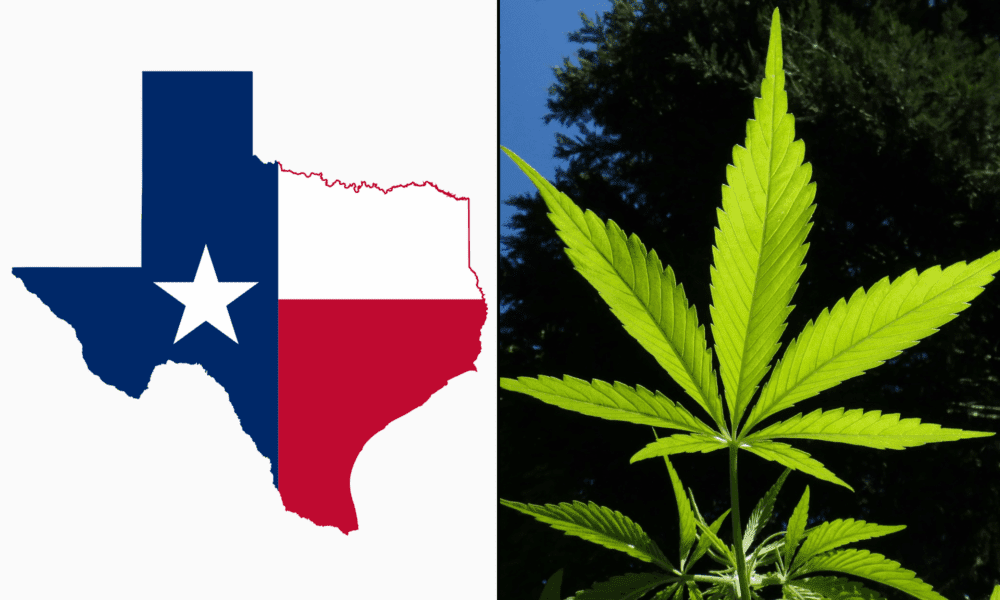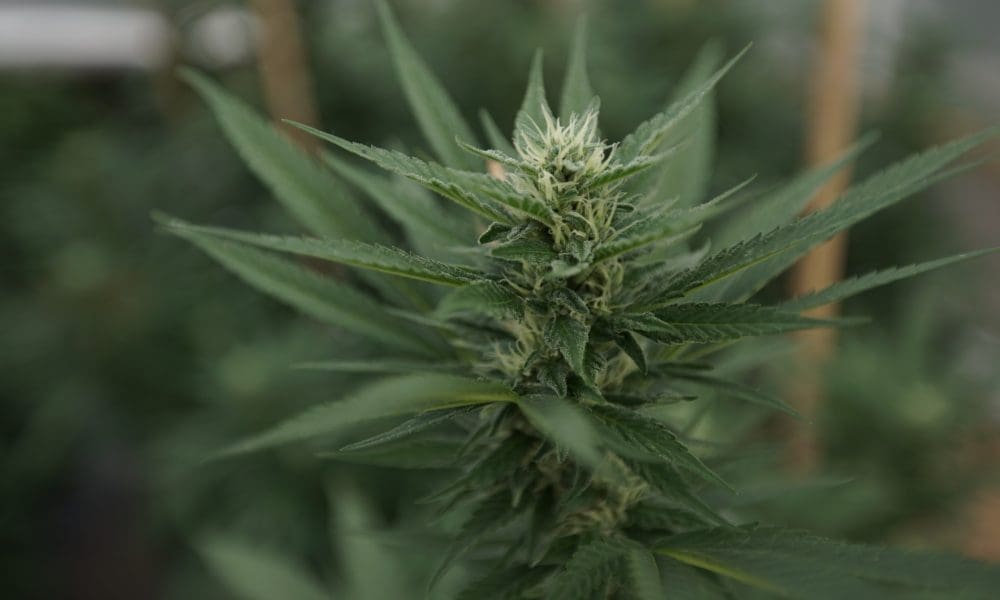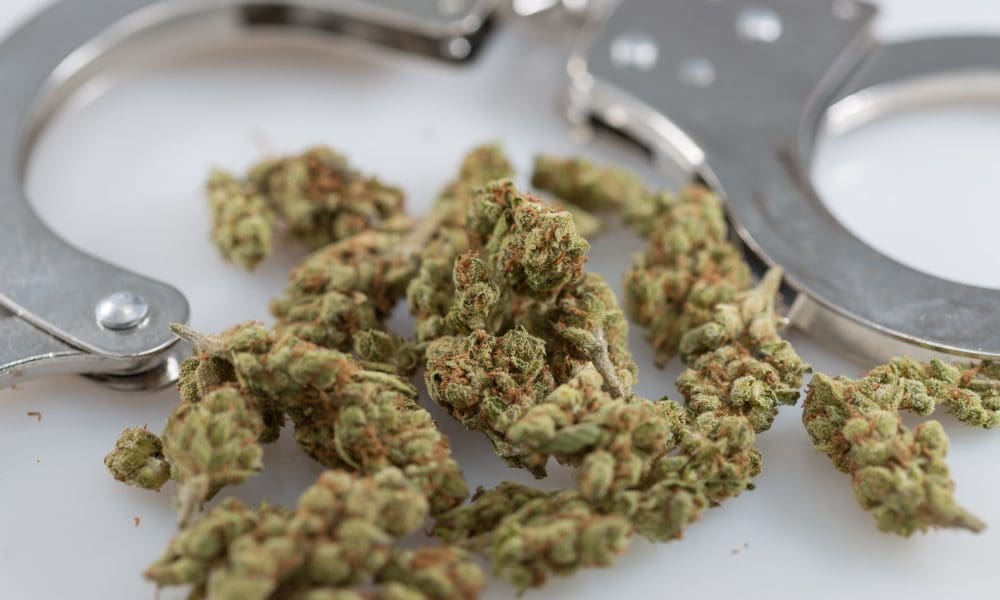featured
Why Is Texas Supporting Psychedelics Research While Criminalizing Cannabis? (Op-Ed)
Published
8 hours agoon

“This move by Texas officials to expand psychedelics research while maintaining broad cannabis prohibition and considering banning hemp products as well isn’t just hypocritical. It’s illogical.”
By Adam Stettner, FundCanna
Texas just announced it will invest $50 million into studying ibogaine, a powerful psychedelic drug that remains illegal at the federal level. The goal? To develop it into a potential Food and Drug Administration-approved treatment for conditions like opioid use disorder, PTSD and depression; especially among veterans.
On the surface, this might sound like a bold and progressive move. But here’s the irony: at the very same time, Texas continues to criminalize cannabis and might soon even outlaw hemp-derived THC products.
Let’s break this down. Cannabis, a plant with centuries of use, decades of medical data and broad public support remains illegal for adult use in Texas. Despite overwhelming national support for legalization—a staggering 88 percent of Americans now back medical or recreational cannabis use)—the state has chosen to double down on prohibition, with lawmakers sending Gov. Greg Abbott (R) a bill that would outlaw consumable hemp products with any traces of THC. He has until Sunday to decide whether to allow that ban to take effect.
Even worse, prohibition isn’t stopping anything. The black market is thriving in Texas. Cartels and illicit operators flood the state with unregulated, untested cannabis. No taxes are collected, no consumer protections exist and legal hemp retailers are now being threatened. It is a misguided public safety argument deluded by a lack of facts and science, political conservatism, contradictory business objectives and outdated stigmas.
Meanwhile, ibogaine, a hallucinogenic alkaloid that can induce intense psychedelic experiences, is now the subject of a $50 million state-funded research push. The same lawmakers who claim cannabis is too dangerous and not well studied are throwing their support behind a compound with far less research and much more uncertainty with the intent of studying it.
This isn’t a critique of psychedelic medicine. Ibogaine may very well hold incredible therapeutic value. But if Texas is willing to support cutting-edge, controversial treatments for serious mental health and addiction issues, why not start with widely available data and access to cannabis? Cannabis has already been shown to help with chronic pain, anxiety, sleep, seizures and opioid dependency.
As for our brave veterans, 41 percent of our military veterans that use cannabis say their use is medicinal and nearly all Veterans that use cannabis say the plant has helped them. According to the VA, about 1.1 million vets live with PTSD and the National Institutes of Health (NIH) National Library of Medicine reports cannabis has been shown to assist Canadian veterans. Cannabis is federally legal in Canada, where the federal government has chosen to reimburse veterans for cannabis use for over 18,000 veterans, all of whom claim it has helped with pain, sleep, PTSD and emotional distress. NIH and Veterans of Foreign Wars have both quoted studies that show cannabis benefits veterans. THC has been shown to assist veterans with PTSD, anxiety, depression and nightmares.
This move by Texas officials to expand psychedelics research while maintaining broad cannabis prohibition and considering banning hemp products as well isn’t just hypocritical. It’s illogical. If Texas genuinely wants to support veterans, reduce opioid deaths and improve mental health outcomes for their citizens, it would be significantly more logical to first legalize and regulate cannabis. Doing so would generate tax revenue, reduce black market activity and provide immediate, research-backed relief to people in need.
Instead, Texas is sending mixed messages. On one hand, it claims to be forward-thinking and compassionate, funding research on experimental psychedelics. On the other, it continues to criminalize a plant that’s already helping millions of people nationwide.
You don’t need to be a doctor or a policy expert to see how backwards this is. It’s not about safety, science or public health. It’s about politics. And in the meantime, Texans are paying the price through lost tax revenue, criminal convictions and lack of access to safe, legal cannabis medicine—something nearly 85 percent of the country already has.
If Texas really wants to be a leader in the future of plant-based medicine, here’s a thought: start with cannabis.
Adam Stettner is an entrepreneur, financial executive, and founder/CEO of FundCanna, a leading provider of financial solutions for the cannabis industry. With over 30 years of experience in business and capital markets, throughout his career he has funded over $20 billion to consumers and businesses nationwide, he is a vocal advocate for balanced, logical, data-driven policy and law in emerging or underserved industries.
Image element courtesy of AnonMoos.

Author: mscannabiz.com
MScannaBIZ for all you Mississippi Cannabis News and Information.
You may like
-


Meet Minnesota's first licensed cannabis retailer | FOX 9 Minneapolis-St. Paul
-


Maryland governor pardons 7,000 cannabis offenses
-


New York Officials Award First Round Of Grants To Help Marijuana Businesses With Startup Costs, Prioritizing Justice-Involved Licensees
-


New Hampshire Lawmakers Advance Psilocybin Penalty Reform But Reject Medical Marijuana Homegrow
-


Maryland Governor Marks Juneteenth With Another Mass Marijuana Pardon For Nearly 7,000 People
-


Viral video of schoolgirl smoking marijuana NOT from Nigeria, say police
featured
New York Officials Award First Round Of Grants To Help Marijuana Businesses With Startup Costs, Prioritizing Justice-Involved Licensees
Published
5 hours agoon
June 19, 2025
New York officials have announced the first round of grants under a $5 million program to help retail marijuana businesses owned by justice-involved people cover startup costs.
About three months after opening up applications for the Conditional Adult-Use Retail Dispensary (CAURD) Grant Program, the Office of Cannabis Management (OCM) and Empire State Development (ESD) announced on Wednesday that they have awarded 52 licensed dispensaries up to $30,000 each in funds meant for startup and operational costs such as rent, renovations, inventory tracking and security systems.
To qualify for the program, applicants need to have been “justice involved”—in other words, impacted by a marijuana-related conviction—and have some experience running a profitable business.
“These grants are about more than dollars and cents, they are about investing in the people and communities who are helping to build New York’s cannabis market the right way,” Felicia A.B. Reid, acting executive director of OCM, said in a press release.
“OCM is proud to support the development of cannabusinesses led by formerly justice-involved entrepreneurs,” she said. “Their work speaks to the incredible promise of business inclusivity and demonstrates what’s possible when equity is more than just a word—it’s a foundation.”
Applicants needed to submit at least $10,000 in eligible expenses in order to qualify for a grant, which could include costs starting from the date they received their final license notice from OCM.
“This funding is giving people entering the cannabis industry a bit of a leg up as they navigate an industry that is still very much in its infancy,” Assembly Majority Leader Crystal Peoples-Stokes (D) said. “This is also about social equity and reinvesting in communities, and I am very happy to see this funding going to communities across the state, and especially in my hometown of Buffalo.”
Sen. Jeremy Cooney (D), chair of the Senate Subcommittee on Cannabis, said that “throughout our efforts to build a thriving cannabis market in New York, we have never lost sight of the equity commitments we made when the MRTA was first passed.”
“The CAURD Grant program is an important step in this process, putting money directly in the hands of local dispensary owners to help grow their businesses and set them up for sustained success,” he said. “I want to congratulate the first round of awardees, and I look forward to our ongoing work to support these entrepreneurs.”
Meanwhile, OCM recently launched a new online map that’s meant to help adults locate licensed marijuana retailers—one of their latest efforts to encourage consumers to buy their cannabis from the regulated market.
After a rocky rollout of the state’s legalization law opened the door to a proliferation of illicit marijuana shops, the governor and regulators have prioritized educating the public about the need to purchase their products from licensed dispensaries as a health and safety imperative.
The broader New York campaign has also involved digital ads and educational resources, including a guide on safe consumption practices, as well as graphics and videos featuring licensed cannabis business owners and messaging about the benefits of participating in the regulated market.
OCM also advises that “continued enforcement against the illicit market is critical to building a health regulated market,” pointing to what it describes as successful enforcement efforts in 2024. Last spring, for example, officials in New York City launched Operation Padlock, an enforcement initiative meant to shutter illegal storefronts. Within months, licensed shops that were open before the operation began saw sales climb 105 percent, according to an OCM survey.
—
Marijuana Moment is tracking hundreds of cannabis, psychedelics and drug policy bills in state legislatures and Congress this year. Patreon supporters pledging at least $25/month get access to our interactive maps, charts and hearing calendar so they don’t miss any developments.![]()
Learn more about our marijuana bill tracker and become a supporter on Patreon to get access.
—
Meanwhile, in New York, regulators are moving forward with new proposed regulations around the state’s so-called “cannabis showcase” program, which allows licensed businesses to sell to consumers at pop-up, farmers market-like events.
As originally authorized, the showcase events were largely in response to the slow rollout of New York’s adult-use marijuana program, which faced multiple delays in implementation amid litigation and other matters.
But the state’s industry has gradually expanded, with officials in January touting $1 billion in total sales since the market launched.
Separately in New York, Gov. Kathy Hochul (D) signed state budget legislation that did not include a controversial earlier provision that would have allowed police to use the smell of marijuana as probable cause that a driver is impaired and then force them to take a drug test.
Amendments made in the legislature removed the provision, which a coalition of 60 reform groups had argued in a letter to Hochul and top lawmakers would “repeat some of the worst harms of the War on Drugs” and allow law enforcement to “restart unconstitutional racial profiling of drivers.”
Meanwhile, a recent OCM report said the number of licensed marijuana retailers in the state grew by nearly threefold last year, fueling total sales in 2024 of nearly $870 million.
Including sales so far in 2025, New York’s legal cannabis market is now close to reaching $1.5 billion worth of purchases, OCM said in April.
Also that month, New York cannabis regulators and labor officials announced the launch of a workforce training program aimed at “providing comprehensive safety education to workers” in the state’s legal marijuana industry.
Separately, OCM’s press secretary recently indicated the office is working on plans to expand permitting and licensing rules that could allow adults to buy and consume marijuana at movie theaters. Authorizing sales of cannabis products at theaters would set New York apart as it continues to build upon the state’s legalization law.
Also, earlier this year, a collective of businesses licensed under the CAURD program called on Hochul to forgive tens of millions of dollars in high-cost loans issued under a governor-created social equity loan fund.
Peoples-Stokes said in December that there’s a need to extend financial aid to CAURD license holders, many of whom are struggling under the high-cost loans.
Critics—including the NAACP New York State Conference, Black Cannabis Industry Association, Minority Cannabis Business Association, Service Disabled Veterans in Cannabis Association, Drug Policy Alliance, NYC NORML and VOCAL-NY—wrote to the governor earlier that month to express dismay at what they described as marijuana regulators’ “efforts in service of big corporations at the expense of small business and equity outcomes.”
Photo courtesy of Chris Wallis // Side Pocket Images.

Author: mscannabiz.com
MScannaBIZ for all you Mississippi Cannabis News and Information.
featured
New Hampshire Lawmakers Advance Psilocybin Penalty Reform But Reject Medical Marijuana Homegrow
Published
6 hours agoon
June 19, 2025
As lawmakers in New Hampshire work to reconcile different versions of bills passed by the House and Senate this session, one conference committee on Wednesday agreed to move forward with a plan to reduce penalties for psilocybin possession while a separate panel rejected a proposal to allow medical marijuana patients to grow cannabis at home.
Both proposals had support from House lawmakers, but—with the exception of the newly advancing psilocybin provision—the Senate has broadly stood in the way of drug reform measures.
Regarding psilocybin, members of a bicameral conference committee voted to advance a compromise version of SB 14, which contains both mandatory minimum sentences around fentanyl as well as the lower penalty for possessing the psychedelic.
As passed by the Senate, the bill would have established mandatory minimum sentences for certain fentanyl offenses. But a House committee last month added language to reduce the penalty for psilocybin, making it a misdemeanor rather than a felony to possess up to 3/4 of an ounce of the psychedelic—at least on the first offense.
One member of the conference committee, Sen. Daryl Abbas (R), emphasized that the reform would apply to first psilocybin possession offenses only.
“Any subsequent offense after the first would still be a felony offense,” he said at Wednesday’s hearing.

Abbas added that the first possession penalty would be an unclassified misdemeanor, meaning prosecutors would have discretion to charge the conduct as either a Class A or Class B misdemeanor, the latter of which does not include jail time.
The measure does not go as far as a separate standalone psilocybin decriminalization bill—HB 528, from Rep. Kevin Verville (R), which would have made a first offense a $100 violation—but it would still end the state’s felony law against simple possession.
The Senate earlier this session rejected Verville’s broader psilocybin decriminalization proposal after passage by the House, but he and others have held out hope for more moderate reform in SB 14.
“We’re not decriminalizing anything,” Verville said Wednesday at the conference committee hearing. “On the psilocybin side, all we are doing is some penalty reform for a first offense.”
He called psilocybin “essentially non-toxic,” saying the average person would need to eat more than 20 pounds of psilocybin mushrooms to risk a lethal dose. “The other thing is, psilocybin is not habit forming. It is not addictive.”
Verville said after House passage of the revised bill earlier this month that while he isn’t a fan of mandatory minimum sentences, SB 14’s proposed penalties around fentanyl “are fairly short sentences for felony crimes,” describing the overall bill as “an excellent trade that is for the greater benefit of the citizens of New Hampshire.”
The proposed fentanyl penalties would affect manufacturing, selling, transporting or possession with the intent to sell. Those activities involving 20 or more grams would carry a 3 1/2 year mandatory minimum prison sentence, while 50 or more grams would mean at least seven years behind bars.
Earlier this week, it briefly appeared the conference committee had given up on the fentanyl and psilocybin bill. Members on Monday declined to move forward with the compromise.
“Unfortunately, the Senate position on psilocybin was clear earlier this year, and we are not going to agree to that part of the bill,” committee member Sen. Bill Gannon (R) told lawmakers on the House side, “which I think kills it for you guys.”
“Hate to waste your time here,” Gannon added at the time, noting that he appreciated the work Rep. Terry Roy (R) had put into the legislation regarding mandatory minimums on fentanyl.
“You know what? That’s OK,” Roy replied. “We’ll be back in the fall and we can look at it again.”

Since that hearing, however, legislative leaders replaced some members of the panel, which appears to have sped a resolution.
The revised SB 14 now proceeds to both legislative chambers for approval before potentially heading to Gov. Kelly Ayotte (R).
As for home cultivation of medical marijuana by patients and caregivers, a separate conference committee that heard SB 118—which primarily deals with nursing homes in the state—voted earlier Wednesday to move forward with a version of the bill that does not contain the cannabis provision added by the House.
“The House conferees have discussed this, and at least three out of the four of us have decided to accede to the Senate position and support the removal of the cannabis [provision] from SB 118 and leave the rest of the bill intact,” said Rep. Wayne MacDonald (R), a member of the panel and chair of the House Health and Human Services Committee.
—
Marijuana Moment is tracking hundreds of cannabis, psychedelics and drug policy bills in state legislatures and Congress this year. Patreon supporters pledging at least $25/month get access to our interactive maps, charts and hearing calendar so they don’t miss any developments.![]()
Learn more about our marijuana bill tracker and become a supporter on Patreon to get access.
—
Rep. Laura Telerski (D), who last week replaced an earlier House member of the panel, expressed disappointment at the move and said she would ask to be replaced on the conference committee.
“I was a part of this committee to hopefully have discussion and defend the House position, which included the therapeutic home growth for cannabis,” she said, adding that home cultivation would expand accessibility and reduce costs for patients. “Unfortunately, I will not be able to support the agreement by this committee, and I will be requesting to be replaced.”
Other members of the conference committee moved ahead with the modified proposal, accepting a House compromise plan minus the cannabis homegrow provision. The agreement will now go to both legislative chambers for their approval.

SB 118 didn’t originally contain the cannabis language, but earlier in the session—following the Senate’s tabling of HB 53, a separate homegrow bill that senators had previously tabled—a House committee had amended the bill to add language from the standalone bill.
So far this session, the Senate has been broadly hostile to drug reform proposals. While a number of bills have cleared the House of Representatives—including a renewed effort to legalize adult-use marijuana—nearly all have gone on to die in the Senate.
“These outcomes are disappointing, but unfortunately, they aren’t surprising,” Matt Simon, director of public and government relations at the medical marijuana provider GraniteLeaf Cannabis, told Marijuana Moment last month.
Earlier in the year, Simon said it appeared “that a few senators just want to kill every bill that deals with cannabis policy, no matter how modest and non-controversial”—an observation that’s largely held true.
As for broader cannabis legalization, the Senate in early May narrowly voted to table a House-passed marijuana legalization bill, effectively ending this year’s effort to end cannabis prohibition in the “Live Free or Die” state.
The chamber voted 12–10 to table the measure, HB 198, from Rep. Jared Sullivan (D). It had previously passed the House of Representatives in March, but weeks later the Senate Judiciary Committee recommended the proposal be rejected.
If enacted, the bill would have legalized noncommercial possession and use of marijuana among adults 21 and older, permitting adults to have up to two ounces of marijuana flower, 10 grams of concentrate and up to 2,000 milligrams of THC in other cannabis products.
Sullivan’s proposal was a pared-down version of a legalization measure lawmakers nearly passed last year, under then-Gov. Chris Sununu (R), but it did not include that bill’s regulated commercial system—a controversial issue that ultimately derailed the earlier effort.
Recent state polling suggests New Hampshire residents strongly favor cannabis legalization. In late April, a Granite State Poll, from the University of New Hampshire’s States of Opinion Project, found 70 percent support for the reform, including majorities of Democrats, Republicans and independents.
“Support for legalization has increased slightly since June 2024 (65%) and remains considerably higher than in the mid-2010s,” it added. “Majorities of Democrats (84%), independents (72%), and Republicans (55%) support legalizing marijuana for personal use.”
Last legislative session, New Hampshire lawmakers nearly passed a bill that would have legalized and regulated marijuana for adults—a proposal that then-Gov. Chris Sununu (R) had indicated he’d support. But infighting over how the market would be set up ultimately scuttled that measure. House Democrats narrowly voted to table it at the last minute, taking issue with the proposal’s state-controlled franchise model, which would have given the state unprecedented sway over retail stores and consumer prices.
Image element courtesy of Kristie Gianopulos.

Author: mscannabiz.com
MScannaBIZ for all you Mississippi Cannabis News and Information.
featured
Maryland Governor Marks Juneteenth With Another Mass Marijuana Pardon For Nearly 7,000 People
Published
7 hours agoon
June 19, 2025
The governor of Maryland has issued another mass pardon for people with past marijuana possession convictions, granting clemency to about 7,000 more people on the holiday Juneteenth that commemorates the end of slavery.
Gov. Wes Moore (D) has been one of the most proactive governors when it comes to cannabis pardons since his state enacted legalization, stressing the need to right the wrongs of prohibition through executive action.
This latest round follows a historic mass clemency action Moore took last year, when he pardoned more than 175,000 convictions for low-level cannabis and paraphernalia offenses.
The governor’s new executive order, which he signed at the Bethel AME Church on Thursday, covers 6,938 people who the state judiciary didn’t identify in the initial round due to technical complications.
“These cases were not included in the initial pardon because they were coded incorrectly, and thus, were not found in the Judiciary’s initial searches of their data,” a spokesperson for the governor’s office said. “The Judiciary recently located these cases when researching their data to determine how best to implement the Expungement Reform Act.”
In a video posted on Facebook on Thursday, the governor said “Juneteenth reminds us of the shoulders we stand on—and our responsibility to hand off this country better than we found it.”
He didn’t describe the latest executive order, but he added that he was “proud to issue the largest state pardon in our nation’s history—pardoning 175,000 Maryland convictions for cannabis possession” last year.
In a separate interview with TheGrio, Moore said the “deeply complicated” history of his state and of the country is a motivator to act on reform.
“The history and inequity of this country—it runs deep,” he said. “That should also serve as fuel and motivation—as an understanding of why we can’t wait. Why we need action.”
“Even after Maryland legalized and made a recreational cannabis market, I had people in my state who could not get a barber’s license or could not get a student loan, or couldn’t get a home loan because of a misdemeanor cannabis conviction that took place in the 1980s,” Moore said.
“As chief executive, as a governor, I have the authority to be able to right so many of these historical wrongs, knowing that these pardons are going to have a disproportionate impact on African Americans, because the impact that we’ve seen on this war has been a war oftentimes on Black communities.”
Adrian Rocha, policy director for the Last Prisoner Project, praised Moore’s latest action, saying it affirms a “commitment to his promise to build a state and society that is more equitable, more just and leaves no one behind.”
“States across the country should be emboldened to follow Moore’s lead,” he said.
In February, the governor also touted in his State of the State address legislation that would expand opportunities for people to have their criminal records for marijuana expunged, allowing people who violated terms of their parole or probation to petition courts to erase those records.
—
Marijuana Moment is tracking hundreds of cannabis, psychedelics and drug policy bills in state legislatures and Congress this year. Patreon supporters pledging at least $25/month get access to our interactive maps, charts and hearing calendar so they don’t miss any developments.![]()
Learn more about our marijuana bill tracker and become a supporter on Patreon to get access.
—
Meanwhile, in April, Moore signed a series of cannabis bills, including one that will require state officials to automatically shield records for low-level marijuana convictions that have been pardoned from public access, and to more broadly expand expungement eligibility for certain other offenses.
He further signed off on legislation that will allow adults to manufacture marijuana edibles and concentrates for personal use, as well as a measure dealing with rules around cannabis consumption lounges.
Separately, the Maryland Senate also passed a measure this session to protect for fire and rescue workers from being penalized for off-duty use of medical marijuana, though it did not advance through the House.
Employers could not “discipline, discharge, or otherwise discriminate against the fire and rescue public safety employee with respect to the employee’s compensation, terms, conditions, or privileges of employment” based solely on a positive screening for THC metabolites under the legislation.
In January, officials in Maryland’s most populous county separately said they were moving to loosen marijuana policies for would-be police officers in an effort to boost recruitment amid a staffing shortage.
Ohio GOP Lawmakers Can’t Agree On How To Amend Marijuana Law, Causing Planned Vote To Be Canceled

Author: mscannabiz.com
MScannaBIZ for all you Mississippi Cannabis News and Information.

Meet Minnesota's first licensed cannabis retailer | FOX 9 Minneapolis-St. Paul

Maryland governor pardons 7,000 cannabis offenses

New York Officials Award First Round Of Grants To Help Marijuana Businesses With Startup Costs, Prioritizing Justice-Involved Licensees

New Hampshire Lawmakers Advance Psilocybin Penalty Reform But Reject Medical Marijuana Homegrow

Maryland Governor Marks Juneteenth With Another Mass Marijuana Pardon For Nearly 7,000 People

Why Is Texas Supporting Psychedelics Research While Criminalizing Cannabis? (Op-Ed)

Viral video of schoolgirl smoking marijuana NOT from Nigeria, say police

Aurora Cannabis Denies 2nd ‘False’ News Report of Acquisition of MedLeaf Therapeutics

Ohio GOP Lawmakers Can’t Agree On How To Amend Marijuana Law, Causing Planned Vote To Be Canceled

Police reveal identities of cannabis smoking school girls in viral video

Nebraska AG Cracks Down on Hemp Stores, Says 90% of Products Inaccurately Labeled

How DC's medical cannabis industry is evolving

California Is Using $30 Million In Marijuana Revenue To Support Research On Consumer Preferences, Crop Yields And Sustainability

California DCC Announces $30M in Grant Funding to Advance Cannabis Research

Federal Bill Would ‘Effectively’ Ban All Consumable Hemp Products—’Including CBD’—Congressional Researchers Say

Watch: Police bodycam captures £700k cannabis raid

Texas Hemp Advocates Nearing 150,000 Signatures Urging Gov. Abbott to Veto SB 3

Minnesota hands out 1st cannabis business license

Pennsylvania Governor Keeps Pushing For Marijuana Legalization As Top GOP Senator Rules Out Including It In Budget

Congress can reschedule cannabis more quickly than DEA, report says (Newsletter: June 19, 2025)

Wildfire Smoke, Increase in Marijuana Use

Delaware Lawmaker Pulls Bill to Restrict Intoxicating Hemp Products

Dozens arrested as federal agents, soldiers raid marijuana farms in Southern California

Hemp Companies Sue Maryland Over Cannabis Licensing

Alert: Department of Cannabis Control updates data dashboards with full data for 2023

Connecticut Appoints The US’s First Cannabis Ombudsperson – Yes there is a pun in there and I’m Sure Erin Kirk Is Going To Hear It More Than Once!

5 best CBD creams of 2024 by Leafly

Free delta-9 gummies from Bay Smokes

EU initiative begins bid to open access to psychedelic therapies
New Study Analyzes the Effects of THCV, CBD on Weight Loss

Curaleaf Start Process Of Getting Their Claws Into The UK’s National Health System – With Former MP (Resigned Today 30/5/24) As The Front Man

Mississippi city official pleads guilty to selling fake CBD products

May 2024 Leafly HighLight: Pink Runtz strain

Horn Lake denies cannabis dispensary request to allow sale of drug paraphernalia and Sunday sales | News

5 best autoflower seed banks of 2024 by Leafly

Discover New York’s dankest cannabis brands [September 2024]

Nevada CCB to Accept Applications for Cannabis Establishments in White Pine County – “Only one cultivation and one production license will be awarded in White Pine County”

Press Release: CANNRA Calls for Farm Bill to Clarify Existing State Authority to Regulate Hemp Products

Local medical cannabis dispensary reacts to MSDH pulling Rapid Analytics License – WLBT

The Daily Hit: October 2, 2024

6 best CBD gummies of 2024 by Leafly

5 best THC drinks of 2024 by Leafly

5 best delta-9 THC gummies of 2024 by Leafly

Weekly Update: Monday, May 13, 2024 including, New Guide for Renewals & May Board meeting application deadline

People In This State Googled ‘Medical Marijuana’ The Most, Study Shows

PRESS RELEASE : Justice Department Submits Proposed Regulation to Reschedule Marijuana

Thailand: Pro-cannabis advocates rally ahead of the government’s plan to recriminalize the plant

Press Release: May 9, STIIIZY and Healing Urban Barrios hosted an Expungement Clinic & Second Chance Resource Fair
Trending
-

 California Cannabis Updates1 year ago
California Cannabis Updates1 year agoAlert: Department of Cannabis Control updates data dashboards with full data for 2023
-

 Breaking News1 year ago
Breaking News1 year agoConnecticut Appoints The US’s First Cannabis Ombudsperson – Yes there is a pun in there and I’m Sure Erin Kirk Is Going To Hear It More Than Once!
-

 best list11 months ago
best list11 months ago5 best CBD creams of 2024 by Leafly
-

 Bay Smokes12 months ago
Bay Smokes12 months agoFree delta-9 gummies from Bay Smokes
-

 Business9 months ago
Business9 months agoEU initiative begins bid to open access to psychedelic therapies
-

 cbd1 year ago
cbd1 year agoNew Study Analyzes the Effects of THCV, CBD on Weight Loss
-

 Breaking News1 year ago
Breaking News1 year agoCuraleaf Start Process Of Getting Their Claws Into The UK’s National Health System – With Former MP (Resigned Today 30/5/24) As The Front Man
-

 Mississippi Cannabis News1 year ago
Mississippi Cannabis News1 year agoMississippi city official pleads guilty to selling fake CBD products

